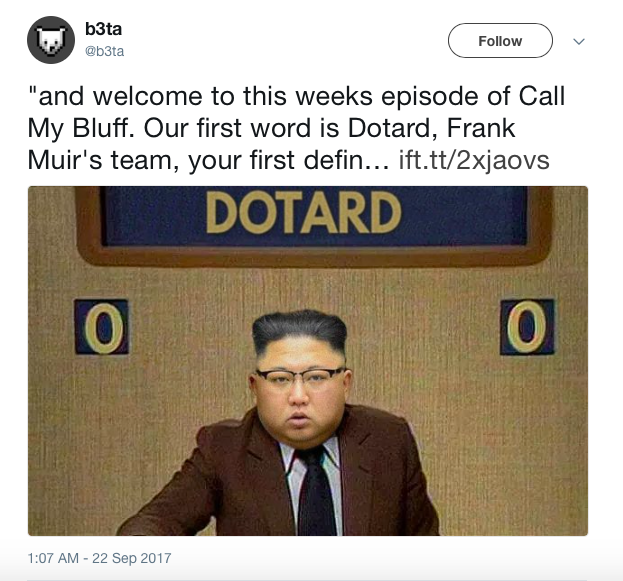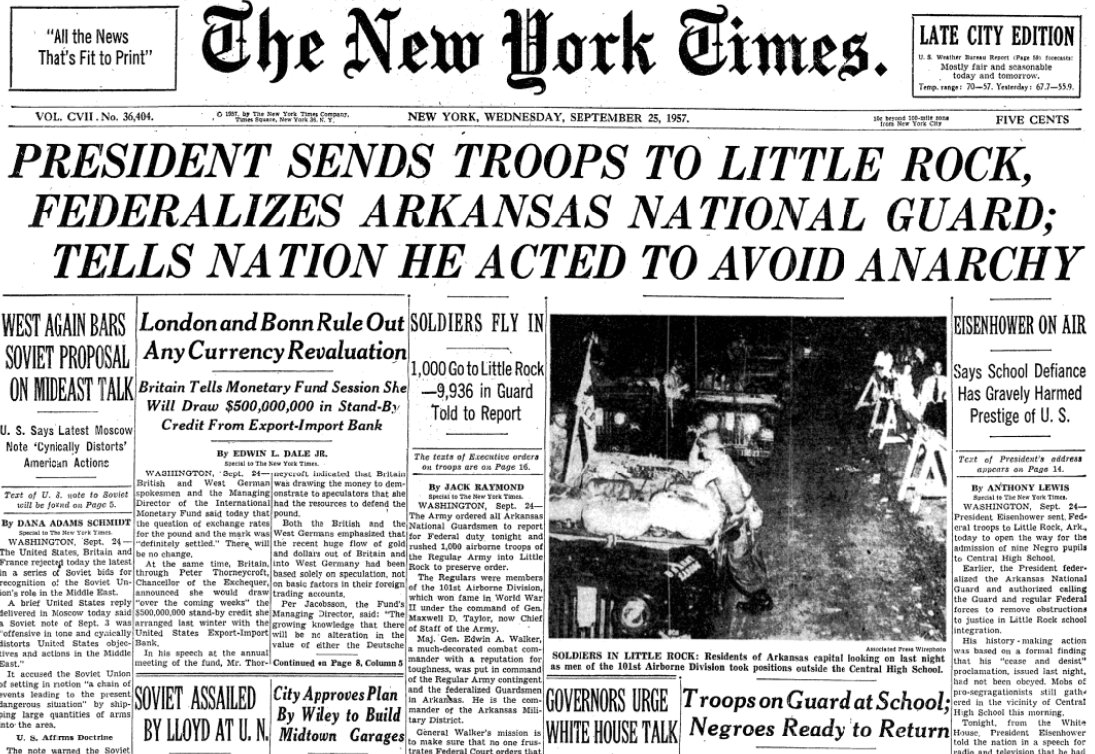When world leaders throw personal insults, what does it mean for diplomacy? Meanwhile, has President Trump fumbled in escalating athletes’ protests against racial injustice?
Donald Trump, as we knew from last year’s primary and presidential election campaigns, loves giving his opponents nicknames. Little Marco, Lyin’ Ted, Crooked Hillary, Low-Energy Jeb – all fell victim to his dubious mastery of the childish put-down.
As CNN observed this week, though, none of them, apparently, had access to nuclear weapons. In Kim Jong Un, Trump met his match; and the world was suddenly a more dangerous place.
After the head of the most powerful nation on earth decided the best he could come up with to label arguably the world’s second-most unpredictable leader was the name of Elton John’s first big hit, Kim shot back, calling the US president a “mentally deranged dotard.”
The statement immediately sent searches for the word “dotard” (apparently the direct Korean translation is “old beast lunatic”) as “high as a kite” according to Merriam-Webster, while the BBC helpfully offered a history of its usage.

Father Ted writer Graham Linehan tweeted: “Everyone’s looking up ‘dotard’ and saying ‘oh yeah, that’s bang on actually..’”
But by last night, this increasingly surreal war of words had escalated to the point where, after Trump tweeted that North Korea “might not be around much longer,” Pyongyang said it considered that statement a “declaration of war” and threatened to shoot down US planes flying near its territory.
The White House, in turn, was forced to deny that the President’s tweet constituted a declaration of war, calling it “absurd”. Think about that sentence for a second. Twitter even said it wouldn’t rule on whether Trump’s tweet violated its rules.
North Korea had responded to Trump’s initial UN speech by warning of an H-bomb test in the Pacific, something which widely-respected defence analyst Malcolm Nance had predicted would “declare North Korea a full nuclear power.” And with warnings that the personal insults and ratcheting up of the bellicose rhetoric could trigger a tragic misunderstanding, there appears to be precious little room left for diplomacy.
China’s UN ambassador cautioned that the alternative to negotiations was “disaster.”
Stephen Blank of the American Foreign Policy Council wrote on Monday that Trump has “substituted impulse for intellect” – a pose that makes the world more dangerous. “There is no strategy here,” Blank says, “just an angry rhetoric of grievance.”
Trump’s speech to the UN began to sketch out the apparent new norms of the global order: “America First” seems to have spelt the end of American “quiet” power; Teddy Roosevelt’s concept of “speaking softly and carrying a big stick.” Even while Washington says its efforts “aren’t aimed at regime change,” diplomatic moves towards arms control have clearly moved into a new political normality.
Ankit Panda wrote at The Atlantic:
If Trump wanted to reinforce deterrence with North Korea at the General Assembly podium, all he need to do was succinctly communicate that any use of nuclear weapons would elicit the standard “effective and overwhelming” U.S. response. We know what that means; North Korea does, too. And so do U.S. allies. Instead, Trump delivered another round of inelegant and potentially destabilizing messaging that will only harden Kim’s resolve to continue apace with his ballistic missile and nuclear weapons development, and heighten the prospects for catastrophic miscalculation.
Sticks and stones…
Insults and name-calling have always been a part of politics, in the US and anywhere where political opponents subject each other to ridicule – which is pretty much everywhere.
As former Australian PM Tony Abbott – who once threatened to “shirtfront” Vladimir Putin – found out this week, there can be worse treatment by citizens, after he was assaulted in the street. His alleged assailant, identified as Astro “Funknukl” Labe, brilliantly told The Guardian: “If I see an opportunity to improve my life and those around me by nutting Tony Abbott, I’m a pretty pragmatic guy.”
Yet as far as this war of words between Kim and Trump is concerned, this is no laughing matter – the stakes are unimaginably high – and the leaders’ apparent personal pettiness is in danger of eclipsing national interests.
According to the Los Angeles Times, Trump’s aides saw the danger and specifically warned the President against personal attacks on Kim, but to no avail. “As predicted, Kim took Trump’s jibes personally and especially chafed at the fact that Trump mocked him in front of 200 presidents, prime ministers, monarchs and diplomats at the UN.”
But the rhetoric might mean things may be coming to a head somehow: as Steve Bannon said in his American Prospect interview (difficult though it might be for some people to have to admit he’s right about something) there is no military solution – not exactly reassuring to military personnel stationed in Seoul or Japan, not to mention millions of civilians, given the apparently heightened state of unpredictability.
And as if to demonstrate the obvious downside of throwing Twitter into the diplomatic mix, after President Trump reacted to footage of an apparent Iranian missile launch by accusing Iran of “working with North Korea”, the clip turned out to be from a failed test some months ago.
As Adam Mount wrote at The Atlantic this week, the US has been in danger of “sleepwalking” through this episode.
The exchange of threats proves beyond a doubt that the Trump administration’s stance is not moderating North Korea but causing dangerous instability. The theory behind U.S. actions is that it is possible to generate a crisis sufficiently risky that Kim Jong Un will decide to acquiesce and agree that eliminating his nuclear arsenal is better than the risk of a war, regime change, and death. Nine months of this tactic has proven it has had the opposite effect: Pyongyang has tested new missiles at an accelerated rate, a possible thermonuclear weapon, and has signaled that it will overfly Japan regularly. Rhetorical threats cause North Korea to escalate the situation, not back down.

Baltimore Ravens players kneeling in London
Taking a knee
In domestic politics, amid the apparent collapse – again – of GOP attempts to repeal Obamacare, as well as outrage over cabinet members’ use of private jets, and fresh revelations about personal e-mail use by White House insiders, the President chose a rally in Alabama to attack predominantly black athletes who have been protesting racial injustice since the San Francisco 49ers’ former quarterback Colin Kaepernick first “took a knee” more than a year ago.
Trump appeared fixated on the hugely divisive issue over the next couple of days, but may in the end have escalated the debate in a way he might not have imagined – even if the intention was, once again, to rile up his base or distract from other issues.
The protests spread during the weekend’s NFL games, with the Players’ Union criticizing the President’s calls for protesting players to be fired, and the team owners joining in protests as Trump called for a boycott of the league. Angry reactions spilled through other sports, with basketball stars Stephen Curry and LeBron James leaving the President in no doubt where they stood.
Even after Trump praised the “patriotism” of Nascar, its biggest star Dale Earnhardt Jr tweeted in defence of the right to protest. Elsewhere, Stevie Wonder, Eddie Vedder and other performers knelt on their various stages – even some of the weekend’s anthem singers themselves took a knee. Singer John Legend wrote at Slate about why the protests are patriotic.
Veteran sports commentator Bob Costas told CNN: “Patriotism comes in many forms and what has happened is that it’s been conflated with a bumper sticker-style kind of flag-waving and with the military only, so that people cannot see that in his own way Colin Kaepernick, however imperfectly, is doing a patriotic thing.”

Because after all, what does freedom mean if it doesn’t include the freedom to speak out when we believe our country is failing us? And how far have we really come from the front page of the New York Times 60 years ago yesterday, which reported on the historic desegregation of Central High School in Little Rock, Arkansas.
President Trump has denied his attack on the NFL and the protesting players is about race.
But by twisting this latest controversy into being about patriotism rather than justice, Trump inevitably prompts a debate about whether citizens should be made to stand for a flag, or the flag should be one that people want to stand for. And in even having that conversation – even though he’s still without a job – Colin Kaepernick has most certainly won.
Sooner or later, someone is going to take a knee in front of the President. How he reacts then, really is anyone’s guess. For now, though, this latest battle in the culture war has much further to run.
Mr Trump can likely also expect further attacks in coming days from those who think he hasn’t been paying enough attention to hurricane-ravaged Puerto Rico.
The Guardian’s Ed Pilkington writes:
Hot on the heels of the billowing dispute he single-handedly provoked over African-American sporting figures protesting racial inequality during the national anthem, Trump launched another provocation on Monday night with a belated and lacklustre response to the Puerto Rican disaster. In a series of three tweets he effectively blamed the islanders – all of whom are American citizens – for their own misfortune…
Most Puerto Ricans were spared the experience of reading Trump’s tweets as a result of the ongoing total blackout of the island.
Also published on Medium.
